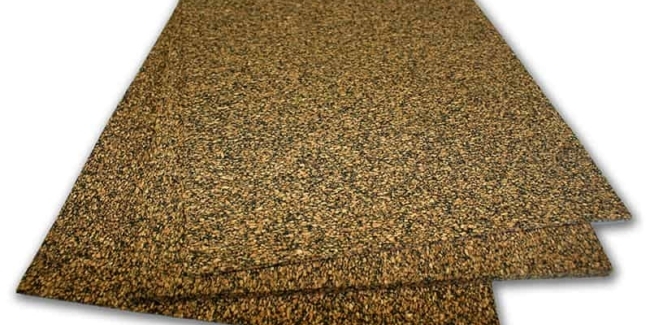
Neoprene Cork Sheet
High-Performance Neoprene Cork Sheets for Sealing, Insulation, and Vibration Control
At Advanced Seals & Gaskets Ltd, we supply premium neoprene cork sheets, designed for a wide variety of industrial, automotive, and engineering applications. Our in-house manufacturing capabilities allow us to convert these sheets into gaskets, pads, strips, and custom components, with finishes including plain, self-adhesive, or laminated options.
Neoprene cork sheets are stocked in standard thicknesses and rolls measuring 1 meter wide by 10 meters long, with sizes adaptable depending on thickness and application requirements. For custom projects, rolls can be cut into 1-meter x 1-meter or 2-meter x 1-meter sheets, and non-standard dimensions are also available upon request.
What Are Neoprene Bonded Cork Sheets?
Neoprene cork sheets combine natural cork granules with neoprene rubber, producing a flexible, resilient, and durable material. The speckled appearance results from the natural cork grains bonded within the neoprene matrix.
This hybrid material offers:
- Water resistance for outdoor sealing applications
- High-temperature tolerance up to 120°C
- Excellent sound and vibration insulation
- Flexibility and tear resistance for easy cutting and shaping
The material is produced in continuous rolls, which can be cut into sheets or pads for gaskets, washers, and custom components. Many sheets can be supplied plain or laminated with adhesives, foils, or other materials to meet your project requirements.
Product Enquiry
For information on Neoprene Cork Sheet please complete the following quick enquiry or call us on +44(0)1384 252555.
Product Specification & Key Characteristics
- Colour: Natural with black speckled effect
- Density: 0.56–0.70 g/cm³
- Temperature Range: -20°C to +120°C
- Resistances: Oils, water, sound, vibration
- Thickness: 0.8mm – 9.5mm (laminatable for greater thickness)
- Forms: Rolls, sheets, pads, strips, gaskets
Full technical data can be supplied upon request or downloaded from our online portal.
Why Use Neoprene Cork Sheets?
Neoprene cork sheets are highly versatile and widely used for creating custom gaskets, pads, and strips across multiple industries. Their lightweight and durable nature makes them ideal for reducing noise, vibration, and thermal transfer under heavy machinery, in automotive engines, or for industrial equipment.
Key reasons to choose neoprene cork sheets include:
- Cost-effective alternative to sponge or solid rubber materials
- Oil and water resistance for challenging environments
- High-pressure and tear resistance for long-lasting performance
- Excellent sound suppression and vibration damping
- Ability to seal effectively at temperatures up to 120°C
These properties make neoprene cork an ideal solution for automotive, engineering, and manufacturing applications where reliability and material performance are critical.
Advantages of Using Neoprene Cork Sheets
Neoprene cork sheets offer a range of exceptional advantages for industrial and engineering applications:
- Sound Suppression: Reduces noise and vibrations in machinery and vehicles
- Thermal Insulation: Protects equipment and components from heat transfer
- Oil & Chemical Resistance: Suitable for automotive and industrial applications
- Flexible & Tear-Resistant: Easy to cut, shape, and install
- Weatherproof & Durable: Maintains integrity in harsh environments
- Customisable Finishes: Laminated with foils, adhesives, or other materials for specialised applications
- High-Pressure Performance: Maintains seals under heavy load or compression
These features ensure that neoprene cork sheets not only protect components but also enhance operational efficiency by reducing noise, vibration, and potential damage.
Different Grades of Cork Sheets
At ASG, we offer a variety of cork sheet grades, each with unique characteristics depending on the material blend:
- Neoprene Bonded Cork: Combines cork granules with neoprene rubber for oil, water, and vibration resistance. Suitable for automotive, industrial, and engineering applications.
- Natural Cork: Made from cork grains bonded with a liquid binder (‘agglomeration’), ideal for cost-effective sealing, thermal insulation, and acoustic applications.
- Resin-Bonded Cork: Lightweight and flexible, produced with cork granules and synthetic resin. Resistant to certain acids and suitable for water-retaining applications.
- Nitrile Bonded Cork: Combines cork with nitrile rubber granules for enhanced oil and fuel resistance, high-temperature tolerance, and durability in general engineering and automotive use.
By offering multiple grades, ASG ensures that customers can select the most suitable cork material for their specific application, whether that’s for gaskets, pads, strips, or custom components.
Benefits of Neoprene Cork Sheets
- Effective Sound & Vibration Reduction – Ideal for engines, machinery, and industrial equipment
- Excellent Thermal Insulation – Maintains component performance under heat
- Flexible & Easy to Cut – Customisable for strips, pads, and gaskets
- Oil, Water & Weather Resistant – Long-lasting in harsh environments
- Cost-Effective – Alternative to solid rubber or sponge sheets
- Available Laminated – With adhesives or foils for specialised applications
- Versatile Applications – Automotive, industrial, engineering, and manufacturing
Call Now: 01384 252555
Enquire Now
For more information or to discuss a custom neoprene cork sheet solution, contact our team. We can help you select the right grade, thickness, and finish for your specific sealing, insulation, or vibration control needs.
Please contact us using the form below or by calling us on +44(0)1384 252555.





















